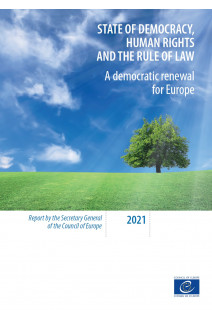Democracy is in distress! The Secretary General of the 47-nation Council of Europe, Marija Pejčinović Burić, has highlighted a “clear and worrying degree of democratic backsliding” in her latest annual report on the state of democracy, human rights and the rule of law across the continent.“In many cases, the problems we are seeing predate the coronavirus pandemic but there is no doubt that legitimate actions taken by national authorities in response to Covid-19 have compounded the situation. The danger is that our democratic culture will not fully recover,” said the Secretary General.
“Our member states now face a choice. They can continue to permit or facilitate this democratic backsliding or they can work together to reverse this trend, to reinforce and renew European democracy and to create an environment in which human rights and the rule of law flourish.
“This is the right option for the 830 million people who live in the Council of Europe area.”
Based on the findings of different Council of Europe bodies, including the European Court of Human Rights, the Secretary General’s report assesses recent developments in areas including political institutions and judicial independence, freedom of expression and association, human dignity, anti-discrimination and democratic participation.
The report encourages member states to use existing and future Council of Europe mechanisms to address many of the challenges identified, on the basis of the following key principles:
- National authorities should return to fundamental democratic principles and recommit to Council of Europe legal standards, including the implementation of judgments from the European Court of Human Rights;
- Member states should fully embrace the multilateralism embodied by the Council of Europe for more than 70 years;
- Covid-related restrictions and measures must not only be necessary and proportionate, but also limited in duration;
- National authorities should embrace democratic culture, recognising where their words, activities or legislation have diminished that culture by reducing civic space, by intimidating or preventing individuals, organisations and NGOs from exercising their freedom of speech or assembly, or by excluding people from participating fully in society.




